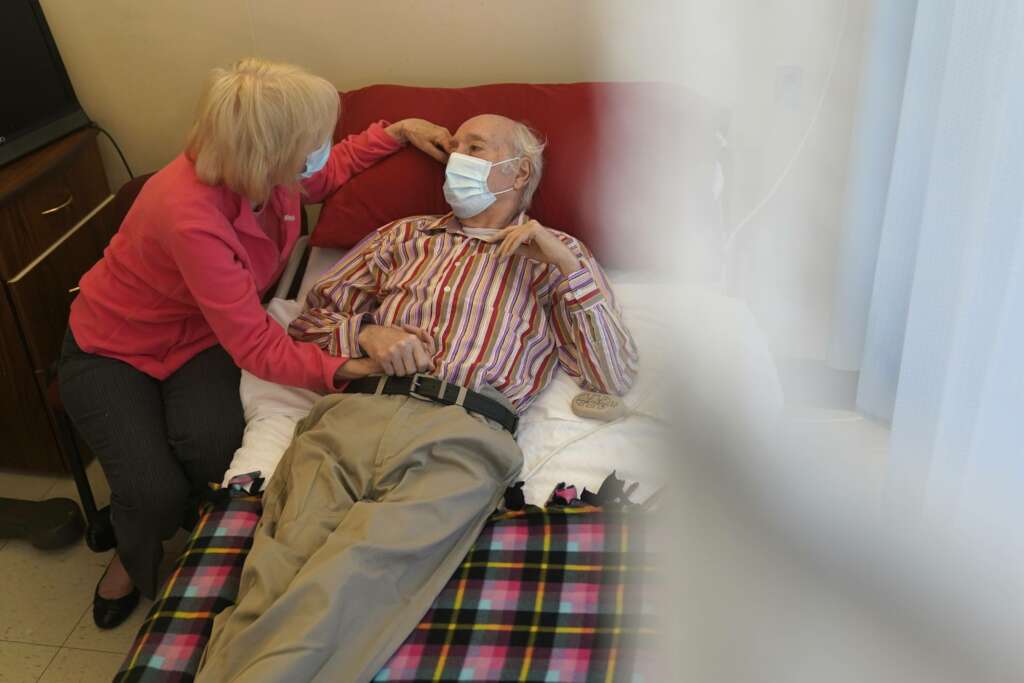
WARSAW, Poland (AP) — Hospitals in Turkey and Poland are filling up. Pakistan is restricting domestic travel. The U.S. government will send more help to the state with the country’s worst infection increase.
The worldwide surge in coronavirus cases and deaths includes even Thailand, which has weathered the pandemic far better than many nations but now struggles to contain COVID-19.
The only exceptions to the deteriorating situation are countries that have advanced vaccination programs, most notably Israel and Britain. The U.S., which is a vaccination leader globally, is also seeing a small uptick in new cases, and the White House announced Friday that it would send federal assistance to Michigan to control the state’s worst-in-the-nation transmission rate.
The World Health Organization said infection rates are climbing in every global region, driven by new virus variants and too many countries coming out of lockdown too soon.
“We’ve seen rises (in cases) worldwide for six weeks. And now, sadly, we are seeing rises in deaths for the last three weeks,” Dr. Margaret Harris, a WHO spokeswoman, said at a briefing in Geneva.
In its weekly epidemiological update, the WHO said over 4 million COVID-19 cases were reported in the last week. New deaths increased by 11% compared to last week, with over 71,000 reported.
The increasing infections, hospitalizations and deaths extend to countries where vaccinations are finally gaining momentum. That leaves even bleaker prospects for much of the world, where large-scale vaccination programs remain a more distant prospect.
In Turkey, which is among the badly hit countries, most new cases of the virus can be traced to a variant first found in Britain.
Ismail Cinel, head of the Turkish Intensive Care Association, said the surge was beginning to strain the nation’s relatively advanced health care system and “the alarm bells are ringing” for intensive care units, which are not yet at full capacity.
“The mutant form of the virus is causing more harm to the organs,” Cinel said. “While 2 out of 10 patients were dying previously, the number is now 4 out of 10. And if we continue this way, we will lose six.”
Turkish President Recep Tayyip Erdogan eased COVID-19 restrictions in early March to minimize pain to his nation’s ailing economy. The new spike forced him to announce renewed restrictions, such as weekend lockdowns and the closure of cafes and restaurants during Ramadan, which starts April 13.
Turkish medical groups say the reopening in March was premature and that the new measures do not go far enough. They have been calling for full lockdowns during the holy Muslim month.
In the U.S. capital, President Joe Biden’s administration outlined how the federal government planned to help Michigan better administer the doses already allocated to the state, as well as expand testing capacity and the availability of drugs. The effort will not include any extra vaccine doses, a move Gov. Gretchen Whitmer sought.
Doses are currently allocated to states proportionally by population. Whitmer has called for extra doses to be shifted to states like hers experiencing a sharp rise in cases. She also urged a voluntary two-week halt to in-person high school classes, youth sports and indoor restaurant dining, but stopped short of issuing new restrictions.
In Brazil, which has the second-highest death toll in the world after the U.S., Sao Paulo has started night burials to cope with demand, and school vans have been used to transport coffins. With the pace of vaccination already slow — less than than 3% of Brazil’s 210 million people have received both vaccine doses, according to the research site Our World in Data — some governors have expressed concern about vaccine supplies.
The death toll in Iran is also rising, prompting new restrictions that will take effect for 10 days in 257 cities beginning Saturday. They involve the closure of all parks, restaurants, confectionaries, beauty salons, malls and bookstores.
Authorities in Pakistan, which is in the middle of a third surge of infections, are restricting inter-city transportation on weekends starting at midnight Friday.
Elsewhere in Asia, authorities in Thailand ordered new restrictions Friday in an effort to contain a growing coronavirus outbreak just days before the country’s traditional Songkran New Year’s holiday, when millions of people travel.
In Germany, Poland and other countries in the 27-member European Union, vaccination programs are finally ramping up after a slow start blamed on delivery shortages.
Thousands of German medical practices joined the vaccination campaign this week, helping the country reach consecutive daily records for doses administered. So far, 14.7% of the population has received at least one dose and 5.8% has received both shots.
Yet German health officials are warning of a steep rise in intensive care patients and are calling for stronger action to contain infections.
Neighboring Poland is also seeing a dramatic spike in deaths, and hospitals have been forced to turn away cancer and other patients as ICU and other hospital beds are taken by COVID-19 patients. Hospitalizations of virus patients there have jumped 20% in the past two weeks.
Harris, from the WHO, said the world knows how to fight these surges. She cited good news from the U.K., where new coronavirus cases dropped 60% in March amid a strong vaccination program, “but we have to do it all.”
“We have to keep on social distancing. We have to avoid indoor crowded settings,” she said. “We have to keep wearing the masks, even if vaccinated.”
___
Associated Press writers from around the world contributed to this report.
___
Follow AP’s pandemic coverage at https://apnews.com/hub/coronavirus-pandemic and https://apnews.com/hub/coronavirus-vaccine
Copyright © 2021 . All rights reserved. This website is not intended for users located within the European Economic Area.
